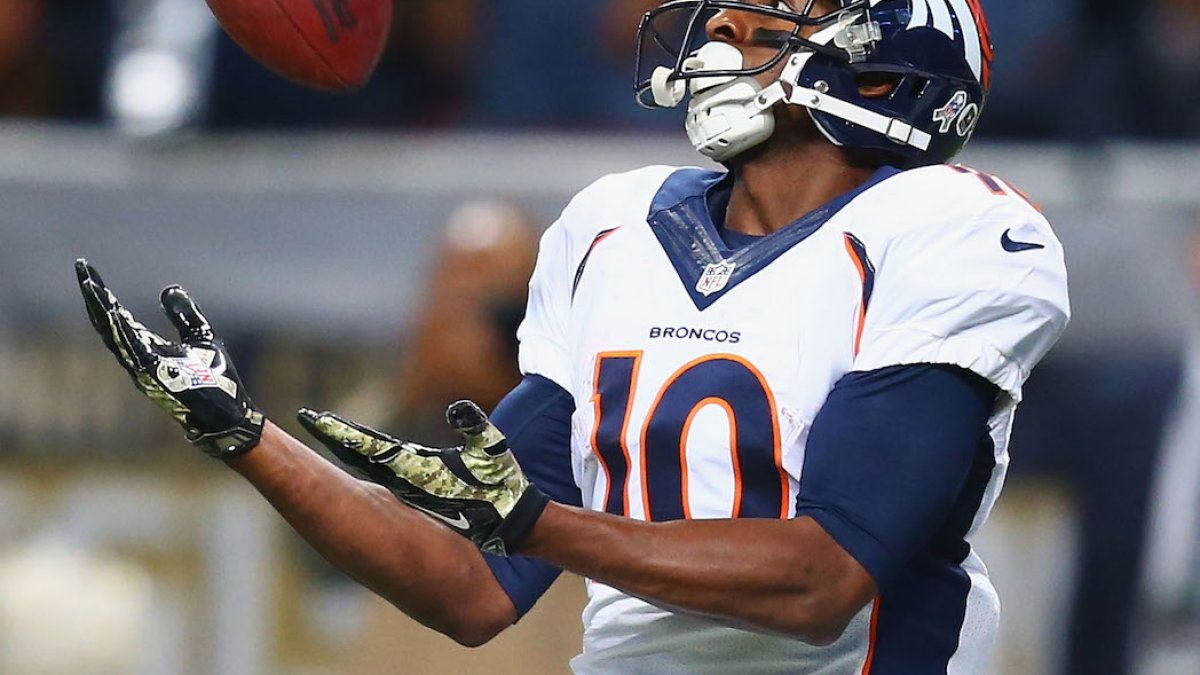Editor’s note: Every day in “Daily Focus,” PFF analysts take the latest NFL news and translate what it really means for each team involved.
Examining Emmanuel Sanders' value to the Denver Broncos: Contract negotiations between the Denver Broncos and WR Emmanuel Sanders are reportedly on hold. Sanders is due $6.6 million this year in the final season of his three-year, $15 million deal with the Broncos. His $5 million per-year average is tied for 29th among wide receivers in the league; in fact, colleague Eric Eager recently ranked Sanders' deal among the five best contracts for NFL WRs currently. So where, does he rank in terms of WR production?
Since coming over from Pittsburgh as a free agent, Sanders’s production has skyrocketed, despite working with relatively average quarterback play from Peyton Manning and Brock Osweiler during the two seasons. Sanders finished the 2015 season with an overall grade of 87.2 — good for 13th among the league's WRs. His cumulative +32.7 receiving grade (0.0 is considered average on the cumulative scale) over his two seasons in Denver ranks sixth in that timespan, even ahead of teammate Demaryius Thomas.
Sanders has proven that he can be successful in nearly any alignment. When aligned in the slot in 2014, his 85.7 percent catch rate and 2.29 yards per route run ranked first and second, respectively, among qualifying receivers. He played much more on the outside last year, and still ranked 16th in overall yards per route run. He can work the underneath routes and does well after the catch, but is also a deep threat downfield. He has ranked among the top 10 receivers in total receiving yards gained on passes targeted 20+ yards downfield both years with Denver.
He’s also been a very reliable receiver, with just nine drops on 209 catchable targets as a Bronco for a 4.3 percent drop rate. Thomas’s drop rate (9.8 percent) is over double that of Sanders' over the past two seasons, with 25 drops on 253 targets.
(PFF Fantasy Insight: Considering Sanders' skillset and that of his quarterbacks, there is some reason to believe in a 2016 rebound from the receiver. That said, our Michael Moore cautions against expecting another top-20 fantasy season from him. He is currently the No. 31 receiver in our staff consensus rankings.)
Sanders is not a prototypical wide receiver, but he’s been highly productive as Denver’s No. 2 WR for the past two seasons, and is still just 29 years old. Whoever turns out to be the starting quarterback in 2016, Sanders will again be an integral piece of the offense’s success. With so much money already invested in Thomas and the Broncos also needing to extend OLB Von Miller, they very well may not be able to afford to keep Sanders as well. Over the past two seasons, he has proven to be among at least the top 20 receivers in the league, and is definitely the caliber of player the Broncos should keep if they can work out the financials.
Washington's decision to withhold long-term deal with Cousins a smart move: Pro Football Talk is reporting that Washington QB Kirk Cousins will not be receiving a contract extension prior to next Friday’s deadline. From a team standpoint, this should not be much of a concern. Cousins did play much better in his first full season as a starter. However, he did earn below-average grades in both 2013 and 2014 in limited playing time, and earned above-average overall grades in just five of 16 games last year. Another season prior to a long-term deal gives Washington additional time to evaluate Cousins and his status as their long-term quarterback before investing what could be an upwards of $100 million. If he continues to play better this season, then the difference in contract amounts between now and next offseason should not be so great, and if Washington can confirm that it has its quarterback of the future, then it should be worth any additional investment.
How does Derek Carr compare to Brett Favre? Former Packers, Vikings, and Jets QB Brett Favre said he thinks Raiders QB Derek Carr “is a little more polished” than he was at this point in his career. Our grading doesn’t go back to the early Favre days, but when looking at Favre’s statistics in his second season as a starter, it shouldn’t be seen as a stretch. Favre completed just under 61 percent of his passes and led the league with 24 interceptions in 1993.
After a below-average rookie year that left him as the second-lowest graded quarterback in 2014, Derek Carr took a big step forward in his second season to finish among the top 10 players at the position last year. PFF Senior Analyst Sam Monson recently explained why Carr could become the next great NFL quarterback.


 © 2024 PFF - all rights reserved.
© 2024 PFF - all rights reserved.